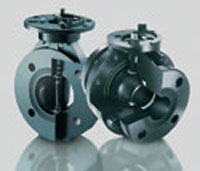 Technology from Europe: Technology from Europe:
United Kingdom
Composite valves pass high-acceleration shock test
Kent-based Advanced Valve Technologies’ composite ball and butterfly valves have passed a high-acceleration shock test for one of the largest navies in the world. This is the first time that non-metallic valves have passed such a rigorous test regime, opening the benefits of non-metallic technology to new users.
 |
Composite ball and butterfly valves were exposed to 200 G accelerations to simulate a torpedo or missile striking a vessel.
|
|
The valves were exposed to accelerations of up to 200 g to simulate a torpedo or missile striking a vessel. For another navy, the valves were subject to a barge test where explosive charges were detonated below a test assembly in a floating test vessel. In both cases, the company’s ball and butterfly valves passed.
For marine and offshore customers, this test verifies the mechanical characteristics that composites offer within a completed piping solution. Composite valves offer weight, purchase price, installation cost and lead-time savings.
The company offers composite valves for demanding industrial applications such as chemical, petro-chem, oil refining, seawater, paper, water treatment, steel and power generation. Composite valves can replace PTFE-lined metal, bronze alloy, duplex, Nil-Cor/ Pureflex, Hastelloy and titanium valves in contact with hydrochloric acid, seawater, brine, sulfuric acid, firewater, caustic, H2S, phosphoric acid, solvents, and over 300 other chemicals.
Glass-reinforced, composite technology offers a low-risk, cost-effective solution to corrosion applications with ball and butterfly valves. The company’s composite valves are in use with engineering organizations of the world including the US Navy, Royal Navy, Dupont-Dow, Akzo-Nobel, Petrobras, Exxon, Occidental Chemical and others.
The company offers the only non-metallic valves with API 607 (4th Edition) Fire-safe approval, ABS Type approval, Lloyds Register Type approval, US Coast Guard 46CFR56.20-15 Cat A approval. They also have CE Module H certification, ISO 9001, and TüV approval.
Full-port ball and double-offset butterfly valves are rated to 120°C (250°F) at 20 bar (300 psi) and offer corrosion resistance, a 60% weight savings over metallic valves, outstanding pressure-temperature characteristics and a good cost of ownership for applications in the chemical, offshore and marine markets.
The company announced a new, corrosion-resistant material rated for continuous high temperature operation at 180°C (356°F). This material, AVT525, offers improved corrosion resistance, strength, and abrasion resistance with weight and cost savings over metallic valves. Previous long-term temperatures have been limited from – 40°C ( – 40°F) to 140°C (285°F), which is higher than plastic materials’ ratings.
The new material was developed for applications in steam systems, coke production ovens, evaporator units, exhaust gas systems etc. The new material has five times the corrosion resistance, 60% less weight, lower cost, and ready availability when compared to metal valves handling hot, corrosive media. Compared to PTFE/ PFA-lined metal valves for hot corrosives, the new material is immune to external corrosive attack, immune from liner porosity and permeation, has a full pressure rating at 180°C (356°F), and is lower in cost. 
|

 Technology from Europe:
Technology from Europe:

